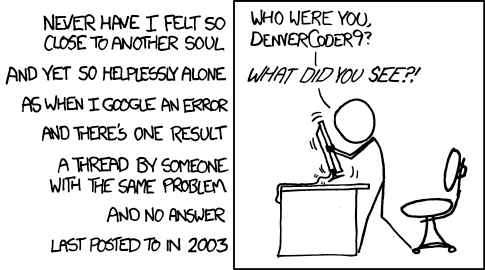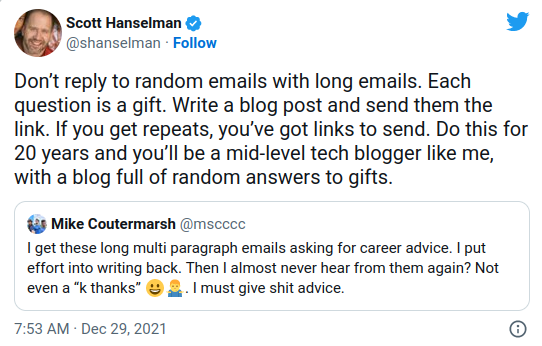Learning In Public
Learning Exhaust
This blog post by swyx highlights the benefits of learning in public:
You already know that you will never be done learning. But most people “learn in private”, and lurk. They consume content without creating any themselves. Again, that’s fine, but we’re here to talk about being in the top quintile. What you do here is to have a habit of creating learning exhaust:
I'm not crazy about the metaphor - there's something a bit 'ickly' about an exhaust - but the notion that my learnings and notes are out there in public for others to see and benefit from is nice. I've also found that I'm more likely to hold myself accountable and follow through with learning if I write in public. It is much too easy to be lazy when things are private.
I consider this site my learning exhaust but I'm also trialling hypothes.is as a way to gather notes too.
Working with the Garage Door Up
I really like this analogy that Andy Matuschak pinched from author Robin Sloan.
The idea is that we should, wherever possible, work work in a public place, talking openly about problems we've yet to solve and stuff that doesn't work yet. In doing so we:
-
Help others who are facing similar problems and our future selves. I'm certainly guilty of solving problems transiently and then months later thinking "hang on a minute, I swear I've done this before".

XKCD 979: Wisdom of the AncientsSharing knowledge benefits everyone so we should do it openly and frequently!
-
Get to hold ourselves accountable and be held accountable: if you promise something in public you're much more likely to go through with it than if you kept it to yourself.
-
We fight back against unrealistic "instagram" success and give a more authentic glimpse of what incremental progress looks like. Things don't magically pop into existence, they often take weeks, months or years to be built. We are used to highly curated feeds of social influencers who present themselves as magically successful and hide their labours and I think that's a bad expectation of what life is like for us to be setting for each other.
Publish, Don't Send
In this blog post, Herbert Lui talks about how it is often better to write publicly than it is to just send stuff as an email (and if full public isn't an option then you could write an internal team blog or something along those lines):
15/5 Updates
In this blog post (mirror) Shaun 'swyx' Wang writes about a practice called 15-5 reports: a weekly report that you spend 15 minutes to produce that can be digested by readers in 5 minutes. Send your report to your managers and peers to let them know what's going on and avoid keeping your progress bottled up and siloed.
This format was originally created by Yvon Chouinard of Patagonia in the 1980’s. As Swyx explains:
- Chouinard’s format uses 4 sections:
- This week (completed activities, notable wins, what’s working)
- Next week’s priorities
- Challenges/Roadblocks
- Lessons Learned/Opps for improvement
Many of the folks that Swyx talks about in his blog post capture information about what they've completed throughout their week somewhere private and then spend a few minutes at the end of that week tidying it up.


No comments to display
No comments to display